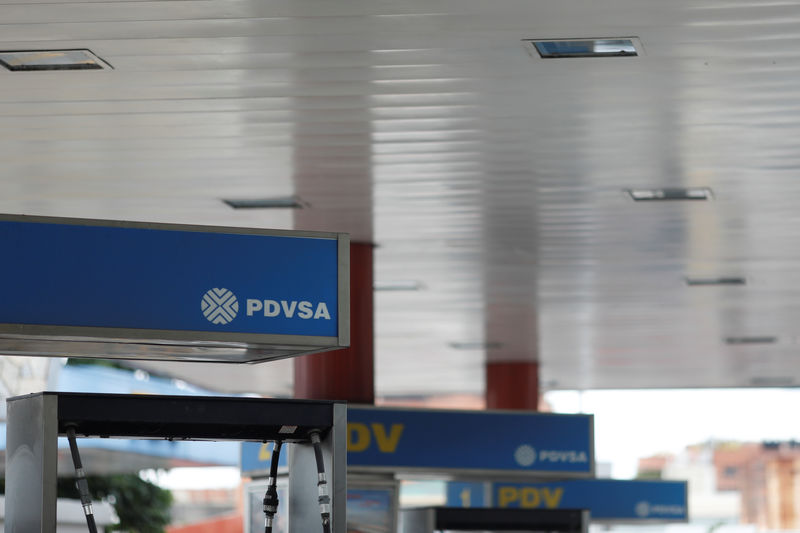By Marc Jones
LONDON (Reuters) - The feared firesale of Venezuela's government bonds after JP Morgan effectively cut them out of its popular bond indices earlier this month has yet to materialize, but things are about to get interesting.
JPMorgan (NYSE:JPM) will only officially start a five-month phase out process on Wednesday. And yet for any index-tracking money manager who still needs to sell its debt holdings, finding any buyers is a tough task.
Most of the $60 billion worth of bonds issued by the Venezuelan government and state oil firm PDVSA have not paid interest for years and the market has been virtually frozen since U.S. sanctions banned their trading back in January.
Washington hoped the move would prevent President Nicolas Maduro’s administration from siphoning off funds from the oil company to maintain his grip on power. That hasn't worked yet, but the bond squeeze has.
The sudden stop in trading meant JP Morgan had little choice but to chop Venezuela. While it avoided the nuclear option of ejecting the country's debt altogether, it cut the index weight down to zero, which has a broadly similar impact.
That means the thousands of fund managers that benchmark their performance against JPM's indices face a dilemma: sell the bonds at whatever price - they are currently marked at just 15 cents in the dollar - or keep them and veer away from the index.
"We will start doing something this week as we will have to realign the funds to the benchmark," said a senior fund manager at a major U.S. investment bank who requested anonymity while the sale was in process. "We will see what the market is like."
Exchange Traded Funds which most closely mimic indexes like JP Morgan's are also expected to be forced sellers.
ETF's are estimated to own around 3 percent of the $3.2 trillion of emerging market debt now in circulation, so if that reads across to Venezuela's $60 billion of bond then as much as $1.8 billion might potentially be up for sale.
The biggest in the emerging market sphere, BlackRock's iShares JPMorgan USD EM Bond ETF, has almost $80 million of Venezuela and PDVSA bonds according to its latest filing. It does however have the wiggle room to invest as much of 20% of its assets away from the index in special cases. A spokeswoman declined to say what it would do in Venezuela's case.
"This is nightmare for passive funds," said Jan Dehn who works at Ashmore a London-based active emerging market fund.
It owns defaulted Venezuela government bonds as well as the more sought-after PDVSA 2020 bonds secured by the oil firm's U.S. refining offshoot Citgo.
Dehn is watching closely for any bargains that pop up. "There is nothing better in finance than forced selling. It is a beautiful thing," he said.
CHEEKY ENQUIRIES
However, plenty of Venezuela holders are sitting tight.
Big name U.S. funds T Rowe Price, Greylock Capital, Fidelity and GMO are part of a creditor group that has formed hoping to shape a potential restructuring deal should Maduro be forced from office.
Aberdeen Standard Investments portfolio manager Viktor Szabo said his firm had received "cheeky enquiries" from would-be buyers - mainly small European or other little known non-U.S. funds - in recent weeks, but had not been tempted either.
"They wanted a few million of this or that particular bond," Szabo said. "But I think they were just fishing for forced sellers."
Interest is usually communicated via the big custodian banks that look after underlying assets, but the intentions that are less clear.
Washington's sanctions also mean there will be no U.S. buyers, ruling out the flock of specialist U.S. funds that pecked at Argentina for over a decade, although they may have built some stakes already.
Venezuela would be prime fodder for litigation-loving funds according to Rodrigo Olivares-Caminal, Chair in Banking and Finance Law at Queen Mary University in London.
Close to $40 billion of its bonds have no Collective Action Clauses (CACs), terms typically spelling out that any restructuring can go ahead with a 75% or 85% approval from investors.
That includes all of the $35.6 billion issued by state-owned oil company PDVSA, which could thus easily be exposed to a lengthy legal grapple with holdouts.
"If you don’t have CACs, you will always have the threat of having holdouts," Olivares-Caminal said.
With the JP Morgan move, "many institutional investors will offload (their bonds), so that is how the bonds will end up in the hands of a different type of investor."
